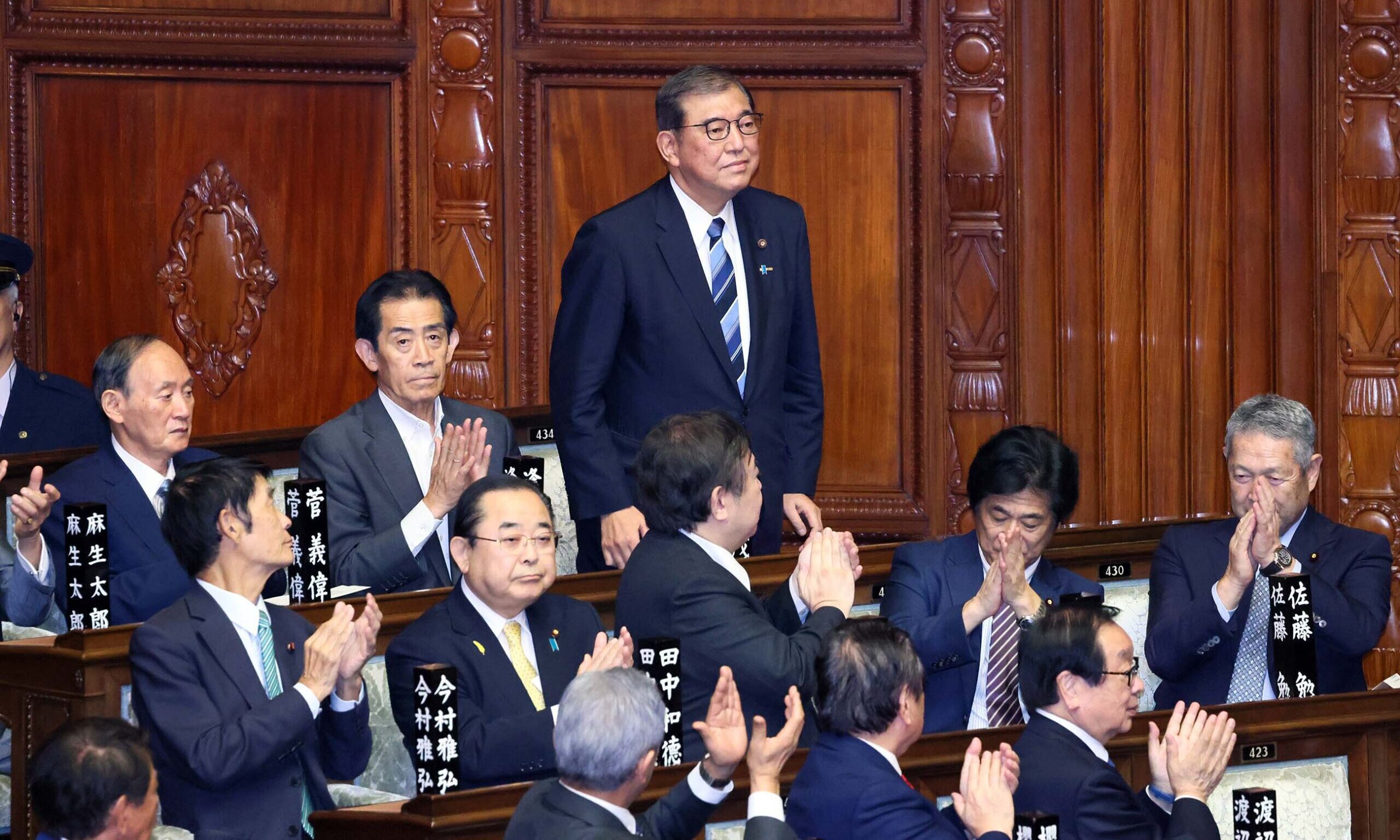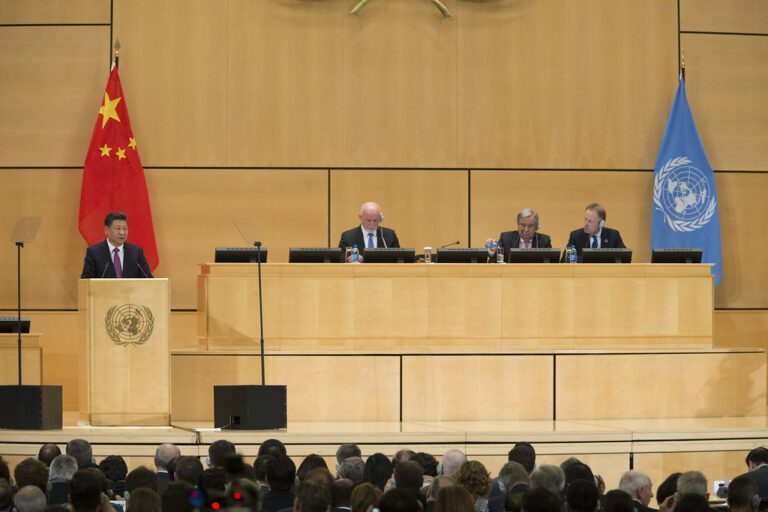
The fall of 2024 has been eventful in Japanese politics. After several months of scandals involving political funds within the ruling Liberal Democratic Party (LDP), Prime Minister Fumio Kishida stepped down and, following the LDP presidential elections in late September, he was succeeded by Shigeru Ishiba. However, the party’s subsequent defeat in the hastily-called House of Representatives elections left Ishiba leading a minority coalition government. As Ishiba’s term –confirmed by the Japanese parliament on November 11 – is likely to have implications for Japan’s China policy, a closer look at Japan’s party dynamics may offer insights into what these could be.
Turbulence in Japanese Politics
These events merely scratch the surface of the ongoing transformations within the LDP, a party that has been the cornerstone of Japanese politics since 1955. The political fund scandal not only led to Kishida’s downfall but also altered the intra-party dynamics, which have long been marked by rival factions. The scandal eroded the credibility of the LDP and its influential factions, prompting Kishida to disband his faction, with others following suit. As a result, the most recent LDP leadership elections were turbulent. Without traditional factional support, the elections produced a surprising outcome: Shigeru Ishiba, long sidelined by previous prime ministers, became the LDP president on his fifth attempt.
Factional politics have traditionally played a key role in shaping Japan-China relations, with factions divided over whether Japan should prioritize economic ties or security issues. Given the uncertainty surrounding the ongoing factional crisis, the future of Japan’s China policy will largely depend on how Ishiba navigates the intra-party situation.
Ishiba’s Views on China
In East Asia, Ishiba is considered a moderate politician, mainly due to his opposition to many of the LDP’s mainstream policies. South Korean media have dubbed him a “dove” within the LDP, owing to his frequent opposition to policies championed by former Prime Minister Shinzo Abe. Chinese experts have also favored Ishiba over his LDP presidential race competitor, Sanae Takaichi, who is seen as more hawkish toward China.
However, Ishiba’s support for constitutional reform – including the addition of a “national defense force” to Japan’s constitution – complicates his label as a dove. His stance could be considered dovish primarily in terms of his preferred form of communication with China. Like his predecessor, he advocates for dialogue with Beijing on issues of mutual concern, while also stressing the importance of strengthening deterrence as part of his national security strategy. As a former defense minister, he is known for his expertise in defense policy, with his cabinet selections further highlighting his commitment to bolstering Japan’s defense capabilities. During an August visit to Taiwan, Ishiba emphasized the need for closer collaboration between Japan and Taiwan to enhance regional deterrence.
The first two months of Ishiba’s term, however, suggest that he might face significant challenges in implementing his vision. His previous exclusion from the party’s core decision-making group has led him to have unconventional perspectives on Japan’s relations with its neighbors and regional security, as seen in his proposal for an “Asian NATO.” He also faces considerable institutional constraints, which became evident when, as a long-standing critic of official visits to the Yasukuni Shrine, he decided to send offerings to the shrine during the annual fall festival, just before the parliamentary elections. Additionally, Ishiba lacks broad support among LDP lawmakers, with some even urging him to resign once the budget for the next fiscal year is approved. Consequently, when it comes to China policy, Ishiba will need to balance his personal beliefs with institutional realities.
The “Asian NATO” Idea
One of the most attention-grabbing ideas Ishiba proposed during his LDP presidential race was the creation of an Asian version of NATO, alongside enhanced national security legislation, a strengthened US-Japan alliance, and the potential introduction of nuclear weapons into the region. The proposal quickly became controversial, with the newly appointed foreign minister expressing skepticism, regional countries criticizing the idea, and US officials dismissing it altogether.
It soon became clear that this proposal – one that could fundamentally alter Japan’s relations with China – was likely to be abandoned. The “Asian NATO” idea should therefore be seen as a campaign tactic rather than a formal government initiative. Given his long-standing position as an “opposition within the party,” Ishiba’s unorthodox ideas found support among rank-and-file party members, including conservative figures in East Asia. Ultimately, the idea, rooted in Cold War-era thinking, seems to have outlived its political purpose.
The Yasukuni Shrine Controversy
Whenever a new government takes office in Japan, its neighbors pay close attention to the newly appointed prime minister’s stance on the Yasukuni Shrine. In the early 2000s, Prime Minister Junichiro Koizumi’s visits to the shrine soured Japan-China relations for several years. Ishiba has expressed a balanced view on the issue, stating that while the government must honor those who died in war, politicians must also consider the international repercussions of their actions. However, to secure support from conservative LDP lawmakers, Ishiba may need to align his views more closely with the party’s traditional stance on this matter.
In October, Ishiba sent offerings to the Yasukuni Shrine, continuing the practice established by his predecessor and provoking anger in China. This move was likely intended to appeal conservative voters ahead of the parliamentary elections. While his rival in the LDP presidential race, Sanae Takaichi, pledged to continue her visits to the shrine, no cabinet minister has ever visited it during the fall festival. Ishiba is, therefore, unlikely to visit the shrine during his term as prime minister, which should prevent further strain in Japan-China relations.
Relations with China
Upon assuming office, Ishiba brought new, distinct ideas about security, that could have significant implications for Japan’s approach to China. However, by the time he began his term, many of these ideas had been scaled back in favor of policies pursued by previous LDP administrations. In his first policy speech to the Diet, Ishiba reiterated Japan’s commitment to maintaining dialogue with China on key issues and collaborating on shared interests, while remaining vigilant against China’s growing influence and efforts to alter the regional status quo.
Ishiba’s immediate priorities will likely focus on guiding the LDP through the ongoing crisis, consolidating his support within the party, and fostering relationships with other parliamentary factions. Consequently, significant shifts in Japan’s China policy are unlikely. The new government is expected to continue engaging with China and avoid provocative actions, such as official visits to the Yasukuni Shrine, while bolstering Japan’s defense capabilities through Indo-Pacific partnerships – a challenging task, especially given domestic economic concerns.
Written by
Vida Macikenaite
VidaMaciVida Macikenaite is an Assistant Professor at the Graduate School of International Relations, International University of Japan. Her research focuses on Chinese foreign policy and international relations in the region surrounding China.


